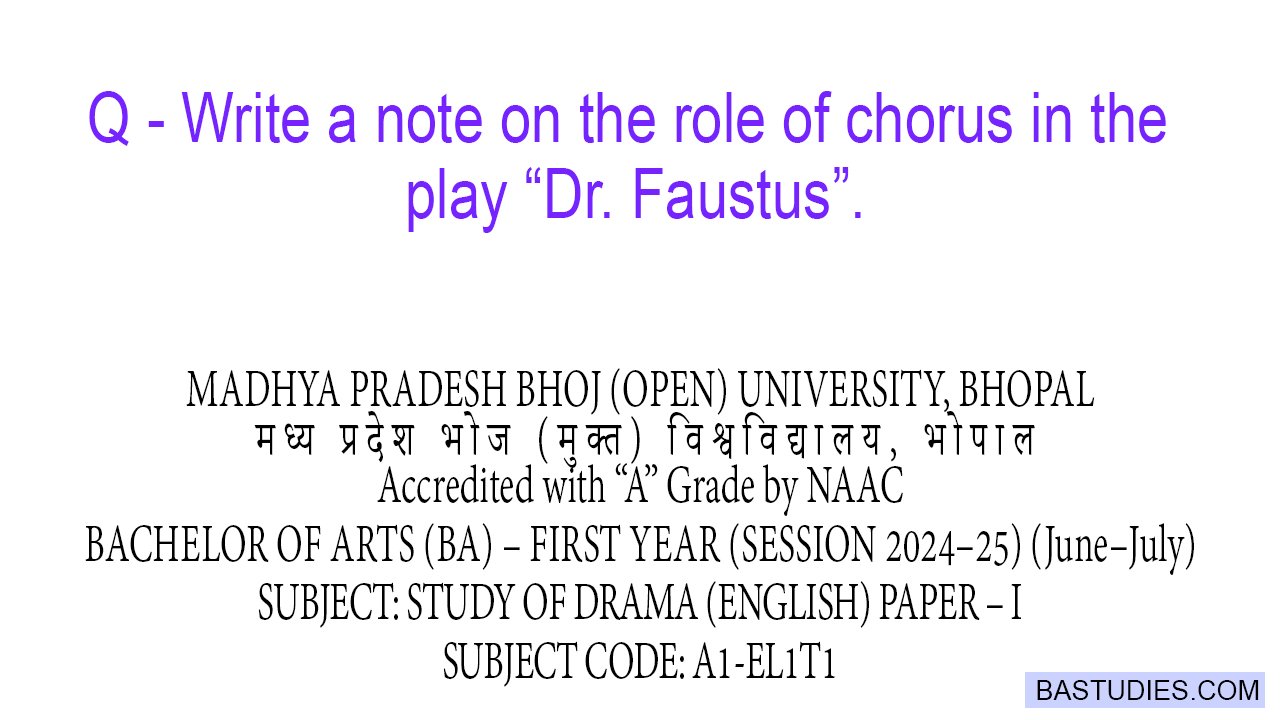Write a note on the role of chorus in the play Dr Faustus
B.A. First Year – Study of Drama (English), Paper – I.
Q – Write a note on the role of chorus in the play “Dr. Faustus”.
ANSWER –
The Role of the Chorus in Dr. Faustus
By Christopher Marlowe
Introduction
In classical Greek theatre, the Chorus served as a group of narrators or commentators who provided background information, interpreted events, and reflected the moral tone of the play. Christopher Marlowe, influenced by classical models, adopted this device in his Elizabethan tragedy Doctor Faustus, although in a modified form. In this play, the Chorus does not consist of a group of people, but instead functions more like a narrator who appears at key points to guide the audience.
The Chorus plays a crucial role in framing the moral and thematic structure of Dr. Faustus and in directing the audience’s understanding of the central character’s journey from ambition to destruction.
1. The Chorus as a Prologue and Epilogue
The play opens and ends with the Chorus, marking the beginning and end of Faustus’s tragic journey.
-
Prologue (Beginning of the Play):
The Chorus introduces Faustus not as a noble king or a warrior, but as a scholar who seeks forbidden knowledge. This sets the tone of the play and alerts the audience that this is a story not of war or love, but of a man’s overreaching ambition.“Not marching now in fields of Thrasymene,
But in the halls of studious Wittenberg…” -
Epilogue (End of the Play):
The Chorus delivers a moral reflection on the tragedy of Faustus. It warns the audience not to be tempted by pride or forbidden knowledge and serves as a conclusion that reinforces the play’s ethical and religious message.“Faustus is gone: regard his hellish fall,
Whose fiendful fortune may exhort the wise…”
2. Providing Structure to the Narrative
The Chorus appears at several points in the play, especially when there is a time gap or a shift in location. These appearances help maintain the flow of the story and make the narrative easier for the audience to follow.
For example, when there is a time lapse between Faustus signing the pact and using his powers, the Chorus fills in what has happened offstage. This is especially helpful in a theatrical setting where stage limitations make it difficult to show everything.
3. Acting as a Moral Guide
The Chorus has an important didactic function. It comments on the moral implications of Faustus’s actions and guides the audience in interpreting his fall as a warning against pride and disobedience to divine law.
By doing so, the Chorus reflects the Christian worldview of the Elizabethan era, emphasizing repentance, divine justice, and the dangers of ambition.
4. Enhancing the Tragic Effect
In a classical tragedy, the Chorus helps to heighten the emotional tone of the play. In Dr. Faustus, the Chorus reinforces the sense of inevitable doom and tragedy. From the beginning, the audience is aware that Faustus is heading toward destruction. The Chorus enhances the sense of dramatic irony by warning the audience even when Faustus himself is blind to the consequences of his choices.
5. Bridging the Gap Between Audience and Action
The Chorus speaks directly to the audience, helping to engage them more deeply with the play. It acts as a bridge between the characters on stage and the viewers, interpreting events and encouraging moral reflection. This makes the audience more involved in Faustus’s journey and ultimate downfall.
Conclusion
The Chorus in Dr. Faustus plays a multifaceted role. It acts as a narrator, moral commentator, and structural guide. It helps the audience understand the tragic journey of Faustus and emphasizes the play’s central themes of sin, ambition, repentance, and divine justice. By framing the story with moral commentary, the Chorus ensures that the play is not just a story of magic and adventure, but a powerful moral tragedy with lasting impact.
READ ALSO – Write a short note on Indian English Drama
READ ALSO – Write a short note on Restoration drama
READ ALSO – Write a short note on Elizabethan Drama
MORE Q&A – STUDY OF DRAMA
